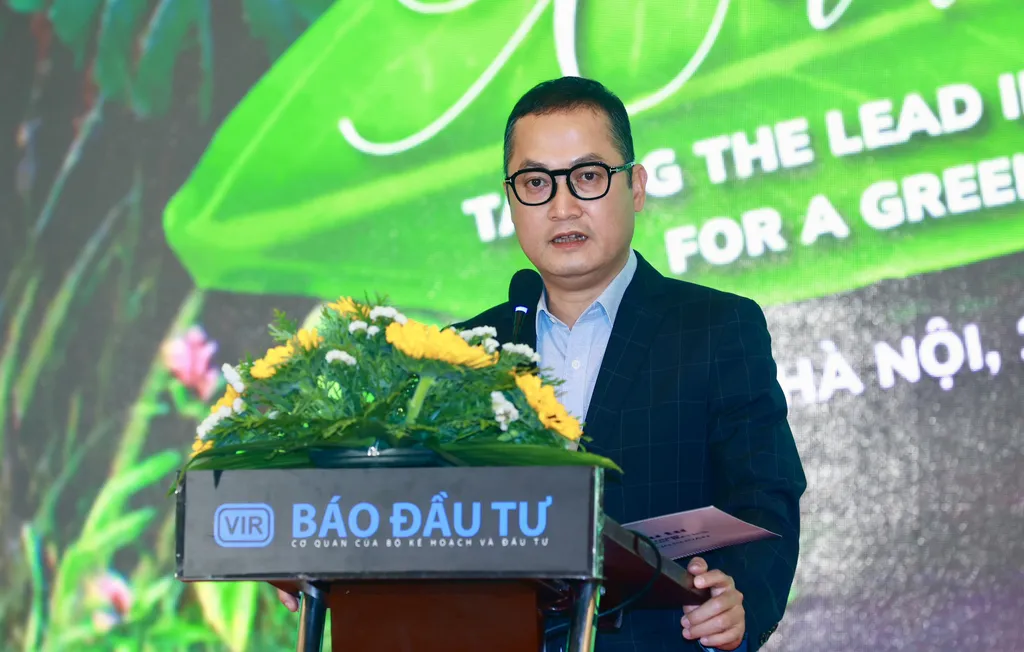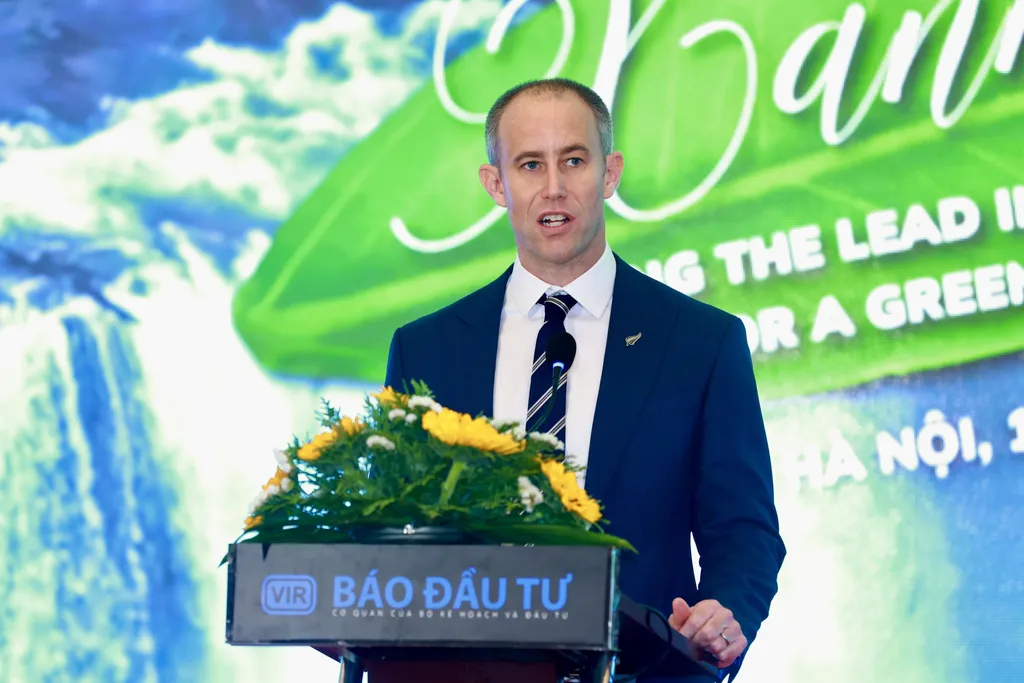 Economy
Economy

.jpg) |
| A panel discussion at the annual Sustainable Development Conference held by the Đầu tư (Vietnam Investment Review) Newspaper on November 12. Photo courtesy of the Đầu tư Newspaper |
HÀ NỘI — Dual transition is an inevitable trend that the Vietnamese business community needs to grasp in the coming years, participants heard at the annual Sustainable Development Conference held by the Đầu tư (Vietnam Investment Review) Newspaper on November 12.
The conference was expected to serve as a bridge between Government agencies, domestic and foreign organisations, experts, businesses and the community, to share valuable practical experiences in sustainable investment, production and business activities, thereby spreading inspiration for innovation and creativity for greener, more sustainable development in key areas.
Opening the event, with the theme 'Taking the lead in dual transition for a green Việt Nam', Vietnam Investment Review editor-in-chief Lê Trọng Minh said that promoting green growth through digital transformation had brought the country a special opportunity to achieve sustainable development, increase labour productivity and improve people's quality of life.
"Innovative solutions coupled with pioneering actions play a nuclear role in promoting Việt Nam's 'dual' transition and sustainable development activities," said Minh.
 |
| Director of the Department of Science, Education, Natural Resources and Environment, the Ministry of Planning and Investment Lê Việt Anh speaks at the event. Photo courtesy of the Đầu tư Newspaper |
Director of the Department of Science, Education, Natural Resources and Environment, the Ministry of Planning and Investment Lê Việt Anh said that digital and green transformation had become the top priorities of most countries in the world, including Việt Nam, towards long-term sustainable development.
“Digital economic development will be the path to creating important breakthroughs for Việt Nam to achieve its goal of becoming a modern industrial country and at the same time, helping to realise sustainable development goals of Việt Nam by 2030," said Anh.
“However, Anh said, these two processes currently mainly take place separately, not synchronised to take full advantage of the potential to increase productivity and efficiency for businesses and economic activities of the economy in general.”
According to the World Bank's 2023 Report on the Dual Transformation trend, in the period 2017 - 2021, Việt Nam held 15 per cent of the total 493 green patents in the emerging market, ranked behind Malaysia (51 per cent) and Thailand (20 per cent). Most of Việt Nam's patents relate to fields such as wind energy, waste management, air and water pollution reduction and green construction.
Meanwhile, in terms of digital transformation technologies, Việt Nam only owned eight per cent of the total 537 patents of developing economies, behind Malaysia (58 per cent), the Philippines (16 per cent) and Thailand (11 per cent). The report shows that digital transformation is an important driving force to promote the success of green transformation and the 'dual' transition trend.
To promote the 'dual' transition process, Anh recommended that digital transformation and green transformation needed to be closely and organically linked together, both based on an important foundation of science and technology and innovation with high-quality human resources. Therefore, prioritising investment in science and technology and training high-quality human resources must be the prerequisite foundation for successfully implementing the dual transition.
“The destination of the dual transition is by people and for people, with people as the centre. Therefore, this transition process needs to be carried out on the principle of ensuring fairness and equality and we need a roadmap to minimise impacts on vulnerable groups such as the poor and ethnic minorities, women, children and the elderly in this process,” said Anh.
Anh said that implementing the dual transition required close and comprehensive coordination of all stakeholders, in which the State would play a leading role, creating an institutional and policy framework, providing initial support and enterprise community would play a pioneering and core role in this process, especially large enterprises.
“On this occasion, I call on businesses, large international corporations and FDI enterprises to promote their leading role and support small and medium-sized enterprises in developing countries like Việt Nam during the transition process,” added Anh.
During the event, participants also heard speakers share experiences and successful lessons on green growth and sustainable development.
 |
| New Zealand's Consul-General and Trade Commissioner to Việt Nam Scott James speaks at the event. Photo courtesy of the Đầu tư Newspaper |
New Zealand's Consul-General and Trade Commissioner to Việt Nam Scott James shared that his country took sustainability seriously and its commitment to preserving the natural environment was embedded in both policies and practices.
“New Zealand actively supports our businesses to make sustainability a core part of their export strategy and a point of difference in global markets This is especially important as more than 85 per cent of New Zealand’s exports are going to countries with (ESG) Environmental, Social and Governance legislation in place or coming into force that require businesses to report on sustainability practices," he said.
He added that New Zealand had committed to achieving net-zero carbon emissions by 2050. By investing in research and technology, the country was working toward more efficient, lower-emission farming practices that balance productivity with environmental responsibility.
“Our dedication to renewable energy is another area where New Zealand demonstrates its commitment to sustainability. Around 80 per cent of New Zealand’s electricity already comes from renewable sources and we aim to increase this share to 100 per cent by 2030,” said James.
Nguyễn Thị Ngọc Huệ, General Director of Strategic Human Resource Management, External Communications and Sustainable Development at AEON Vietnam, said that human sustainability was one of the three main pillars of its sustainable development strategy.
“Placing human resources in the role of attaching values and promoting innovation and creativity has brought remarkable results to AEON Vietnam. The harmony between personal goals and corporate culture is the factor that helps each AEON employee feel like they want to bond and contribute more to the company, thereby improving labour efficiency and ensuring the stable operation of the business.
“At AEON Vietnam, we always uphold human values and consider human resource development as the key to the business's sustainable success,” said Huệ. — VNS